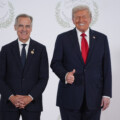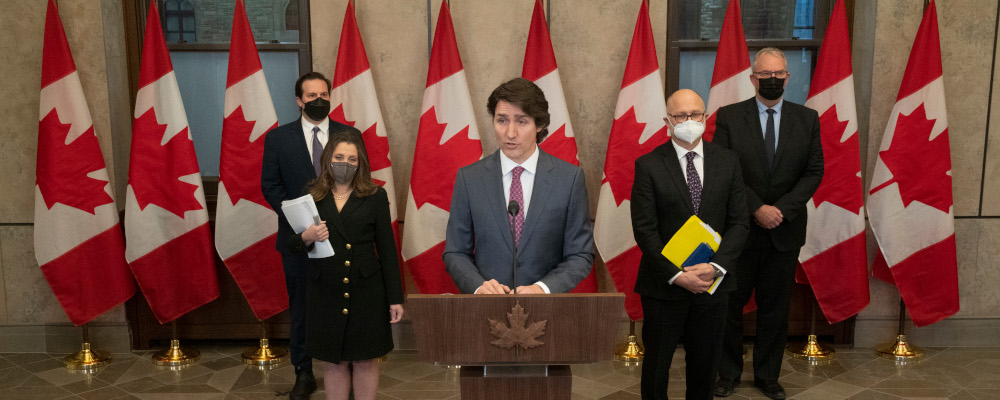The Trudeau government has invoked the Emergencies Act for the first time in Canadian history, and it is on extremely shaky footing to do so.
The Act sets out four kinds of emergencies: public welfare emergency, public order emergency, international emergency, and war emergency. The federal government asserts in its Order in Council that this is a public order emergency, which the Act defines as an emergency so serious it is a “national emergency” and that it “seriously threatens” the ability of the government to preserve the sovereignty, security, and territorial integrity of Canada. This is quite clearly a high bar, and there is no obvious evidence available to the public that it has been met at this time.
This term, the “threat to the security of Canada”, is defined in the Act to remove ambiguity about when this extraordinary piece of government power can be exercised. A “threat to the security of Canada”, under the Act, includes espionage or sabotage, foreign-influenced activities detrimental to Canada’s interests, support of a threat or use of serious violence to achieve a political, religious or ideological objective and activities, and finally, actions directed to destroy or overthrow Canada’s government.
Notably, “lawful advocacy, protest or dissent” are explicitly excluded from threats to the security of Canada, except in combination with the specific types of acts listed above.
It was disturbing, then, to see Justice Minister Lametti’s conclusory assertion that the current protests are unlawful. A bare assertion that protests which have largely been free from violence or property damage are unlawful sets a disturbing precedent. It also reeks of hypocrisy in a country that has in recent memory seen church burnings, railroad blockades, and statue topplings with little police crackdown.
In a free democracy, it’s disconcerting for nonviolent protest to summarily be deemed a legal emergency. Whatever you make of the cause, protest is an activity that is the lifeblood of vibrant democracies. Even The New York Times Editorial Board, calling the trucker protests “a test of democracy”, opined that “We disagree with the protesters’ cause, but they have a right to be noisy and even disruptive. Protests are a necessary form of expression in a democratic society, particularly for those whose opinions do not command broad popular support. Governments have a responsibility to prevent violence by protesters, but they must be willing to accept some degree of disruption by those seeking to be heard.”
The Act also contains strict requirements which must be met before it may be invoked. The crisis must “exceed the capacity or authority of a province to deal with it” and the federal government must consult with the provinces and obtain the agreement of Cabinet prior to invoking the Act. Within one week of the Act’s declaration, Parliament must approve it. Vitally, the Act also specifies that in order for the Act to be applicable, the emergency “cannot be effectively dealt with under any other law of Canada.”
The case for a true inter-provincial crisis is more compelling in the case of the Coutts, Emerson, and especially Windsor border crossings—disruption to our U.S. trade arteries transcends domestic politics, and the loss of hundreds of millions of dollars in trade per day indeed constitutes a national threat. However, the Windsor Police, with reinforcements from across Ontario, safely and swiftly cleared the Ambassador Bridge on February 11 and 12. Alberta and Manitoba have resisted any application of the Act in their provinces, saying they have all the resources they need to manage the crisis.
As for the Ottawa police, their ineptitude is disgraceful. Reporting has suggested that the primary problem is a failure from the leadership: even granted additional resources, they have no plan for how to deploy them, Chief Peter Sloly seemed convinced that there was no policing solution a few days into the protests. (He has since resigned). But declaring the nuclear option in the form of the Emergencies Act does not functionally change any of that.
Invoking the Act would still grant the government some narrow additional powers. It would allow the feds to block off travel between areas of the country, evacuate persons, and remove personal property. They will be able to compel tow truck operators to remove vehicles, which has been a major problem in Ottawa. They also could ban “any public assembly that may reasonably be expected to lead to a breach of the peace”, although, again, this seems to be well within the purview of existing police powers.
Finally, there is the matter of the “follow the money” financial measures announced by Minister Chrystia Freeland yesterday to eventually be permanent by way of new legislation. Crowdfunding platforms and cryptocurrency exchanges will now be required to report transactions over $10,000 to FINTRAC, which seems like a reasonable legal gap to fill. The directive announced requesting that banks freeze and suspend accounts suspected to be involved in supporting the protests without a court order, however, sent a chill down my spine.
Freeland stated: “As of today, a bank or other financial service provider will be able to immediately freeze or suspend an account without a court order.” They will also be protected against lawsuits for freezings accounts in good faith. On its face, this sounds like an invitation for banks to arbitrarily seize the private property of those suspected of involvement with the protests, without any built-in right to apply for reconsideration, whether intentional or inadvertent. The Emergencies Act is subject to the Charter, but this proposal looks like a violation of the Charter’s section 8 guarantee to be free from unreasonable search and seizure. What could possibly go wrong?
Finally, the Act has a built-in mechanism that mandates an inquiry following its invocation. Within sixty days after the expiration or revocation of a declaration of emergency, the Governor in Council must “cause an inquiry to be held into the circumstances that led to the declaration being issued and the measures taken for dealing with the emergency.” But this government owes the country an explanation for invoking these extraordinary measures immediately.
Recommended for You

Poilievre will survive as CPC leader, and Canada will stay golden in men’s hockey: The Hub predicts 2026

Supply management will be sacrificed to appease Trump, and the Netflix takeover is bad for Hollywood: The Hub predicts 2026

Canada will attempt to join the EU and Justin Trudeau becomes a Katy Perry lyric: The Hub predicts 2026

Why Danielle Smith is the newsmaker of the year





Comments (0)